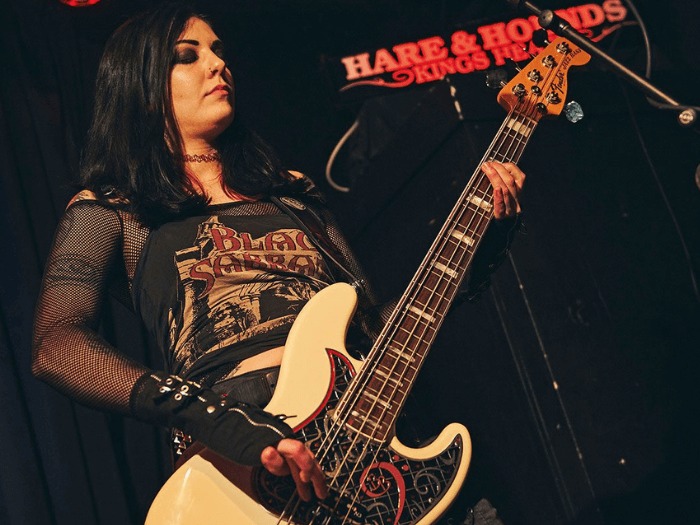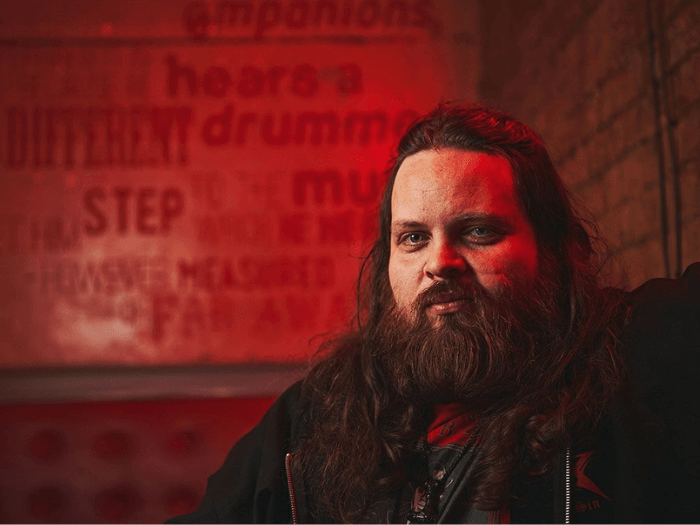Last year, the British metal five-piece found themselves at UrRock Musik Festival in the small, historic town of Sarnen, surrounded by mountains and overlooking the picturesque lake of the same name. So far, so genteel. Except, of course, Fury weren’t there for the Alpine vistas. After almost two years of streamed shows, four days of high voltage noise and giddy, in-the-flesh excess ensued. With their loud, fast and furious brand of fun, they made new fans easily.
“We’re not afraid to dance around and make fools of ourselves,” grins bassist Becky Baldwin, looking casually stage-ready over Zoom with her liquorice-black locks, eyeliner and tattoo choker.
“We ended up in the dressing room of [Indian hard rockers] Girish And The Chronicles,” recalls woolly-hatted frontman/founder Julian Jenkins. “We were consuming multiple bottles of rum and whatever else. I think we must have sung every metal song. We were just in full voice, drumming on things, singing… we were going for about three hours like that, I think.”
Speaking from the same sofa in Birmingham, the two friends quietly confound stereotypes in a genre where women are often expected to be at the microphone (or simply not present). For Becky, such preconceptions have long been par for the course. She says:
“I’ve been in bands where they’re female-fronted and people say, ‘you must be like Evanescence or Nightwish’ and we say, ’no, we’re doing this kind of metal, we sound like Iron Maiden!’. And they’re like, ‘you can’t, there’s a girl singing!’. It’s very frustrating.”
From Bristol to Birmingham
In 2017, still scattered across the country, the group underwent a full line-up change (having first formed in Julian’s hometown of Worcester in 2011). Becky was a natural new addition, having previously stood in at shows for Fury’s old bassist. Based in Bristol at the time – where she studied at BIMM – she’d carved out a commanding reputation in line-ups including punk groups and a metal covers band. "Becky was and is the most prominent bass player, certainly in the underground scene." Julian enthuses.
 "Becky was and is the most prominent bass player". Image credit: Joseph Branston. © Musicians' Union.
"Becky was and is the most prominent bass player". Image credit: Joseph Branston. © Musicians' Union.
“She’s an incredible bass player. She’s an incredible person, really easy to get along with, we had a very similar ethos when it comes to rock ’n’ roll. Plus, she’s the most professional person I know.”
Julian moved to Birmingham in 2019 to live with his girlfriend, Fury backing vocalist Nyah Ifill. Becky followed in late 2020, during lockdown. “My other band, Hands Off Gretel, is in Sheffield,” she says, of the grunge-punk mavericks she also plays bass for, “so I’m closer to them now, which is really useful. And it’s a really cool city.”
It’s all led to their fourth album, Born To Sin; a meaty, hooky gumbo of classic heavy metal and dramatic sensibilities. Think Iron Maiden, Metallica and Dio, but with a hearty, soulful dose of theatre from Julian’s vocals. The sort of thing Jim Steinman might have come up with, if he’d spent more time hanging out with metalheads at Comic-Con.
Heavy Metal Storytellers
Fuelled by a heady combination of action movies and Iron Maiden records, songwriter-in chief Julian likes to tell stories through songs. He says:
“I love storytelling, it could be a story about flying through space, or a casino in space… a lot of space songs.”
There are real-world moments, too. The moody ‘Who Are You?’ is about reconnecting after lockdown.
“That’s sort of about getting back to live music,” Julian explains, “and seeing people again, and the line ‘who are you?’ is basically saying, ‘maybe you didn’t take the time to get to know people as well as you should have before.’ But now we’ve got a new appreciation of friends and family.”
Long Time Coming
Julian grew up flitting between great-grandparents, grandparents and his mother (his parents split up when he was born). During this time, he ingested an odd cocktail of Simply Red, Michael Jackson and Jean-Michel Jarre, quietly developing an ear for ambitious instrumentals and big melodies.
In high school, a friend gave him Metallica’s seminal S&M, a 1999 live album with the San Francisco Symphony orchestra. “My mind was just blown,” he says. “I listened to that CD obsessively that night, and the next day went to school and said, ‘we’ve got to start a band!’ I need to be able to create music, feelings, whatever it is they’re doing.’”
Undaunted by the fact that none of them played an instrument, Julian and a small gang started jamming in one friend’s coal shed for the entire school summer holiday, playing Metallica tunes and writing their own songs. He never looked back.
 Songwriter-in chief Julian likes to tell stories through songs. Image credit: Joseph Branston. © Musicians' Union.
Songwriter-in chief Julian likes to tell stories through songs. Image credit: Joseph Branston. © Musicians' Union.
Meanwhile, down in Trowbridge, Wiltshire, Becky’s gig-going parents brought classic rock and pop into the house. An oddball from the outset, even as a teenager, Becky didn’t like ‘cool’ music. She chuckles:
“I was kind of a weirdo with no friends. I liked Michael Jackson and ABBA and my parents’ music. I felt very ‘othered’ by the kids around me.”
Hearing Alice Cooper for the first time, at a local carnival, was a turning point. The sound of Poison blasted through speakers, while dancers dressed as skeletons; Becky would be forever hooked on the marriage of horror, drama and hard rock. “And also, it was welcoming of weird people,” she says. “That’s where I found my place.”
Gender Cliches
Heavy metal may have come a long way in terms of balance and diversity, but it’s still a mostly testosterone-fuelled world, where bands are expected to look a certain way. Becky says:
“As a woman, people do often assume that you’re there for merch, or that you’re someone’s girlfriend. Or they assume you’re the singer.”
For Becky, an MU member who handles much of the band’s management, it’s especially frustrating – not to mention patronising. “Sometimes they think I’d be difficult to deal with,” she says levelly, “or that I’m inexperienced or don’t know how to book gigs, or don’t know how deals are normally done… and I’m like, ‘I’ve been touring constantly for the last 10 years, I know what I’m doing.’
“If it was one of the male members [of the band], they’d maybe give them more of the benefit of the doubt about certain things,” she continues, “but they read a certain tone when I say it. Maybe I’m not putting enough smiley faces in my emails or something! I feel like you’ve got to think about it so much more when you’re a woman; because if they feel like you’re telling them how you want something, then you’re being ‘bossy’.
“I guess you’ll never know if that’s actually how that person’s attitude is, you just kind of get a sense for it, or you see what they post online.”
Business Brains
Between the two of them, Julian and Becky have held down a wealth of jobs to fund band life. Becky gives music lessons and makes jewellery with bass strings. As well as bar work, years ago, she spent a summer in the factory where her father works. This convinced her to pursue music full-time, in whatever way she could.
“A lot of people look down on cover bands and I’m like, ‘let me just cry into my cash…’” she laughs. “Or teaching. I don’t care. As long as I’m not having to work in a factory smelling of oil! It’s so monotonous, and Heart radio plays the same five songs for nine hours a day.”
So far, it’s working. 2022 brings more shows, including their first proper European tour. Unsurprisingly, Brexit-induced red tape is complicating matters, in particular merchandise imports, Carnets and tour visas.
 “As a woman, people do often assume that you’re there for merch, or that you’re someone’s girlfriend. Or they assume you’re the singer.” Image credit: Joseph Branston. © Musicians' Union.
“As a woman, people do often assume that you’re there for merch, or that you’re someone’s girlfriend. Or they assume you’re the singer.” Image credit: Joseph Branston. © Musicians' Union.
Like many of their peers, Fury have little-to-no crew, so it’s all on them to make it work. “There’s so much stuff like this to figure out,” Becky breaks into a laugh, “and we’re not naturally this way inclined!”
And that’s the reality; the vast majority of today’s rising bands, heavy or otherwise, have to be that bit more savvy in order to thrive, compared with their predecessors. They learn the business of it because they must, in service of the music they love – and you can’t be in such a world if you don’t love it.
Julian recalls:
“Our first gig back was Bloodstock, after almost two years. As soon as we started gigging again, it hit me that this is who I am. This is what I love doing.”
Equality and the MU
Becky joined the MU in 2011. Her lecturers at BIMM in Bristol had recommended membership so she could access advice about finances and more. A few years later, she was wrangling with gender prejudice on an arts job site and reached out to the MU. This led to her joining its Equalities Committee. Becky adds:
“There was this website that you could apply for various jobs from. I was looking at the bass-player roles and an alarming number of them said ‘male applicants only’”.
She recalls: “If you registered male or female – and you’re forced to choose male or female – you can’t contact that person at all. All the ones that were ‘anyone can apply’ were unpaid projects, but the ones that were guaranteed money were all male-only.
“This is discrimination on so many levels. There was a Beyoncé tribute show, and it said ‘male only applicants’. She famously has an all-female backing band!
“There have been several times I’ve contacted the MU to look over a contract,” she continues, “and at the start, a lot of it was for networking; I was quite new to the Bristol music scene, there were social events, you could go on free courses. I think it’s a great thing.”